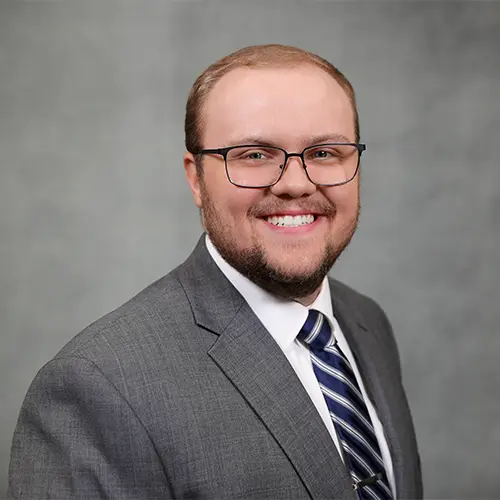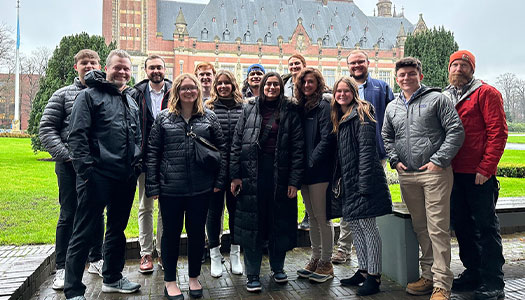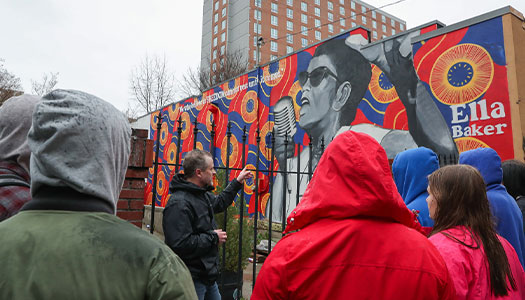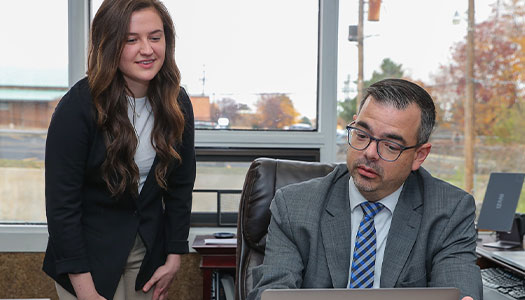The Kearney Law Opportunities Program (KLOP) is a partnership between the University of Nebraska at Kearney and the University of Nebraska College of Law, designed to recruit high school students from rural Nebraska and prepare them to eventually return and practice law in rural Nebraska. To apply, you must have applied and been admitted to the University of Nebraska at Kearney. The KLOP application is open now through November 15, 2025. Access the online application below and click on "Admitted Incoming Freshmen” to apply.
Contact
If you have questions about KLOP, please contact:
Dr. Chuck Rowling
Email: rowlingcm@unk.edu
Phone: (308) 865-8171
- 98%Percent of UNK Pre-Law students who applied and were accepted into a law school program
- Nov. 15Deadline to apply for KLOP.
- 55+Number of students freshmen to senior year who are participating in the KLOP program.
*Based on internal data of UNK Pre-Law students, 2018-2024
Benefits of KLOP
- Students selected for KLOP will receive a full tuition scholarship to UNK for up to 120 credit hours.
- Each KLOP student receives one-on-one mentorship from the Pre-Law/KLOP faculty adviser throughout their time at UNK.
- KLOP students receive numerous career and professional development opportunities, including: preferred access to law-related internships; frequent visits to the UNL College of Law; regular interactions with attorneys, judges and current law students; and extensive undergraduate research opportunities.
- As a KLOP student, you will have the opportunity to participate in two field study courses during your time at UNK: (1) a one-week trip to the southern United States to learn about the politics and law of the US civil rights movement; and (2) a two-week trip to Europe to learn about international human rights law.
- After receiving a bachelor’s degree at UNK, this program guarantees a student’s acceptance into Nebraska College of Law at UNL, provided minimum requirements are met (GPA, LSAT score).
Eligibility
- Must be a rural Nebraska resident (students from the following cities and towns are not considered rural and therefore are not eligible: Omaha, Ralston, Boys Town, Elkhorn, Lincoln, Bellevue, Papillion, LaVista, Chalco, Offutt Air Force Base).
- Must apply and be admitted to the University of Nebraska at Kearney.
- Minimum high school cumulative GPA of 3.5.
- Preferred (but not required) ACT score of 27 or above.
How to Apply
- The KLOP application deadline is November 15, 2025.
- Access the online application and click on “Admitted Incoming Freshmen.”
- You must set up a user name and password to complete the electronic application.
- You will be asked to complete two essays.
- Provide names and emails of two individuals who can provide a reference letter.

“I could not feel more CONFIDENT as I begin my journey away from UNK and towards law school. KLOP has provided me an affordable, high-level undergraduate experience. It has also grown my network as I move into the post-undergraduate aspect of a legal career and opened my eyes to opportunities to work and practice in rural Nebraska.”
UNK Pre-Law Day
Have you ever considered law school or pursuing a career in law? UNK Pre-Law Day will allow you to meet with current students, faculty and local attorneys, and learn about the experiential learning and professional development opportunities available within our Pre-Law program, including the Kearney Law Opportunities Program (KLOP). This event is on campus and free to attend. Breakfast and lunch will be provided and parents are welcome to attend.
Pre-Law Day was October 27, 2025. The date for 2026 will be announced at a later time.


UNK students travel to Europe to learn about international law
Eleven members of the Kearney Law Opportunities Program (KLOP) traveled to Europe during the January intersession as part of a new class titled “From the Holocaust to The Hague: The Evolution of International Humanitarian Law.”

UNK political science students learn about civil rights in the South
Jamie Vaughn tightly crossed her arms as she slowly crossed the Edmund Pettus Bridge in Selma, Alabama. Wearing a T-shirt, hooded sweatshirt, jeans and sneakers, the University of Nebraska at Kearney sophomore carefully moved across icy patches on the bridge’s narrow walkway.

UNK program prepares students for law careers in rural Nebraska
According to the most recent statistics from the Nebraska Supreme Court’s Attorney Services Division, 50 of the state’s 93 counties have five or fewer attorneys practicing there and 11 counties don’t have any at all.









